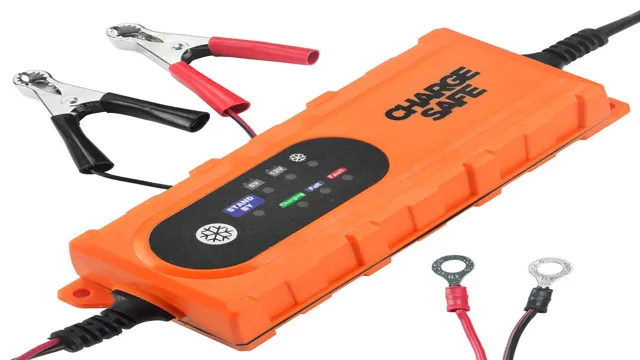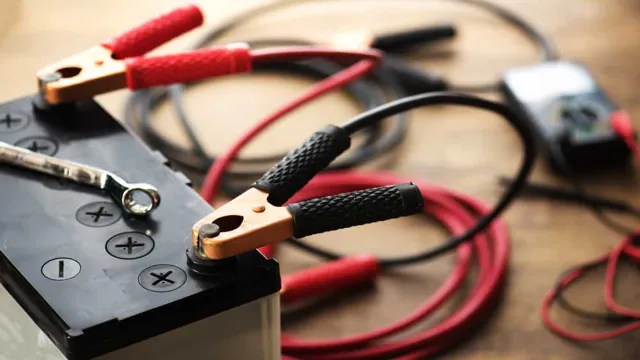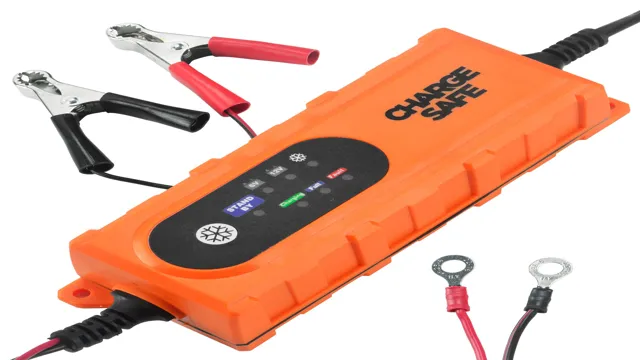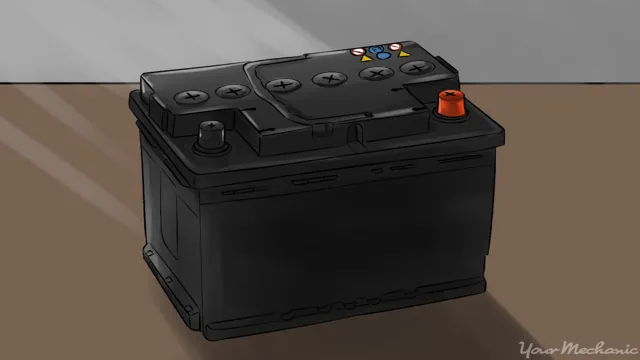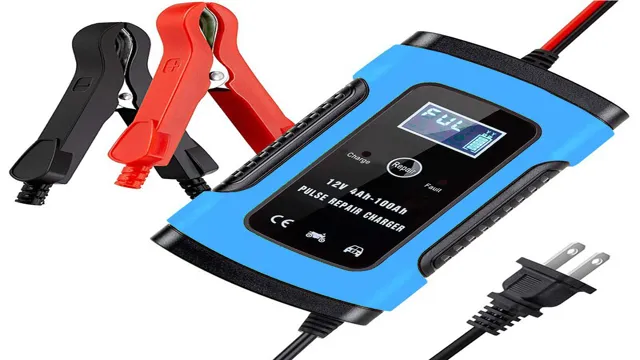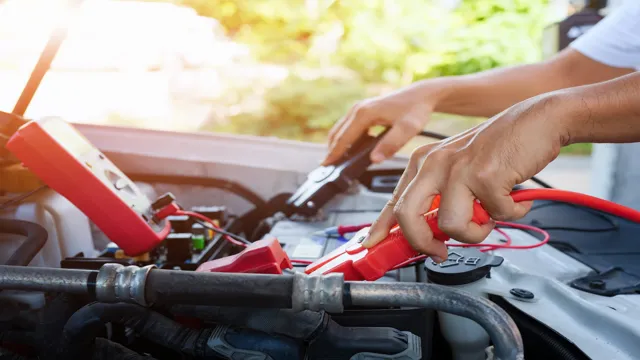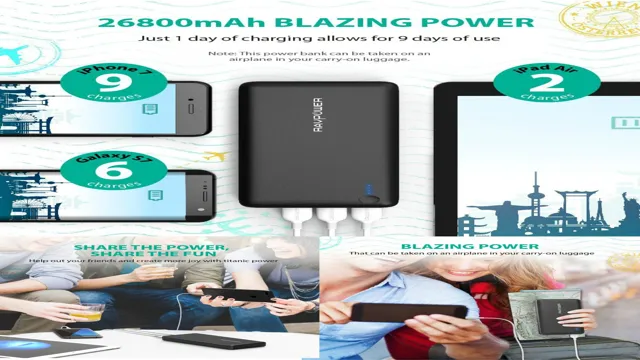Can You Use a Car Battery Charger for a Motorcycle? Here’s What You Need to Know.

Car battery chargers come in handy when you need to give your vehicle a boost. But can you use a car battery charger on a motorcycle? The answer is yes, but there are some things you need to consider before plugging in. In this blog post, we will walk you through the process of using a car battery charger on a motorcycle, so you can recharge your battery and get back on the road with ease.
Whether you are a seasoned rider or new to the world of motorcycles, it’s important to know the right way to connect a car battery charger to your bike and avoid costly mistakes. So let’s get started and learn everything you need to know about using a car battery charger on a motorcycle.
What is a Car Battery Charger?
Yes, you can use a car battery charger for a motorcycle, but it is important to select the right charger. It is not recommended to use a charger with a high amperage as it can damage the smaller battery of a motorcycle. Most car battery chargers have a high amperage that is not suitable for a motorcycle battery.
You can get a motorcycle-specific charger which is designed to charge the batteries with lesser amperage. It’s always best to check the manufacturer’s recommendations and get a charger that is specifically designed for your motorcycle battery. However, if you do decide to use a car battery charger for your motorcycle, make sure to set the amperage on the charger to the lowest setting possible and carefully monitor the charging process.
Keeping the voltage and amperage under control will prevent any damage to the motorcycle battery. So now you know, you can use a car battery charger for a motorcycle, but it’s important to be careful and use the right charger for the job.
Explaining how a car battery charger works
A car battery charger is an essential tool for every vehicle owner. It is used to recharge your car battery when it runs low and can save you money and time in the long run. The charger works by converting the AC power from an outlet into DC power that is needed to recharge your battery.
It does this through a process called rectification, where the charger converts the AC current into a pulsating DC current. The charger then filters this pulsating current to smooth it out and ensure a steady flow of DC power to your battery. This process ensures that your battery is recharged efficiently and safely, without overcharging or damaging it.
There are various types of car battery chargers available, including trickle, quick, and multi-stage chargers, each with their unique features and benefits. Using a car battery charger correctly and regularly will ensure that your battery remains healthy and ready to use when you need it.

Can You Use a Car Battery Charger on a Motorcycle?
Yes, you can use a car battery charger on a motorcycle battery, but you need to ensure that the output voltage of the charger matches the voltage of your bike’s battery. A typical car battery charger provides 12 volts whereas motorcycles usually run on 6-volt or 12-volt batteries. If your motorcycle battery is a 6-volt battery, you need to use a charger with a 6-volt output.
On the other hand, if your motorcycle battery is a 12-volt battery, you can either use a car battery charger with a 12-volt output or a motorcycle battery charger specifically designed for 12-volt batteries. It’s important to note that charging a motorcycle battery with a car battery charger will take much longer to complete than a motorcycle battery charger, and that overcharging can damage the battery. Always follow the guidelines and instructions provided with your charger and the vehicle’s battery to ensure safe and proper usage.
Comparing the differences between a car and motorcycle battery
When it comes to charging a motorcycle battery, many people wonder if they can use a car battery charger instead. The answer is yes, but with some caveats. A car battery charger typically uses higher amperage than what a motorcycle battery requires, so it’s important to be careful not to overcharge the smaller battery.
Additionally, motorcycle batteries are often located in different areas than car batteries, so it may be more challenging to find a suitable charging location. However, with the proper precautions and attention to detail, using a car battery charger on a motorcycle battery can be a convenient and effective solution. Just be sure to follow the manufacturer’s guidelines and specifications for both the charger and the battery.
Examining compatibility between car and motorcycle battery chargers
When it comes to charging your motorcycle battery, you may wonder if using a car battery charger is a viable option. While it’s true that car and motorcycle batteries are both lead-acid batteries, there are some differences in their voltage and amperage ratings. Car batteries typically have a higher voltage and amperage rating compared to a motorcycle battery.
As a result, using a car battery charger for your motorcycle battery may overcharge it, causing damage to your battery. Conversely, using a motorcycle charger to charge a car battery may not provide enough power to charge it completely. To avoid any damage to your motorcycle battery, it’s best to use a charger specifically designed for motorcycle batteries.
This way, your battery can be charged at the right voltage and amperage to ensure optimal performance and longevity. So, while it may be tempting to use a car battery charger on your motorcycle, it’s not recommended, and it’s best to invest in a dedicated motorcycle battery charger for your bike.
How to Use a Car Battery Charger on a Motorcycle?
“Can you use a car battery charger on a motorcycle?” This is a common question that arises when motorcycle battery starts to fail, and you do not have a charger specifically designed for it. Fortunately, you can safely use a car battery charger on a motorcycle, given that you understand the differences between the two. Even though car batteries are bigger than those of a motorcycle and will require more power to charge, the battery charger’s voltage must still be at 12 volts, like that of a motorcycle.
You should also ensure that the charger has a low amperage setting to prevent the battery from overheating. Furthermore, make sure that the charger has alligator clips that could easily connect to the motorcycle’s battery terminals. You can carry out the same charging process used for a vehicle by isolating the battery and connect the alligator clips to the positive and negative terminals respectively.
With these simple steps, you should now be able to use a car battery charger on a motorcycle safely.
Providing step-by-step instructions for using a car battery charger on a motorcycle
Using a car battery charger on a motorcycle may sound daunting at first, but it’s actually a straightforward process. First, make sure both the car battery charger and the motorcycle battery are turned off. Then locate the positive (+) and negative (-) terminals on the battery – these are typically marked with a plus and minus sign.
Connect the red clip from the charger to the positive terminal and the black clip to the negative terminal. Once securely connected, switch on the charger and let it run for the recommended amount of time specified by the manufacturer. Keep an eye on the charger to make sure it doesn’t overcharge the battery.
When finished, turn off the charger and remove the clips in the opposite order they were attached, starting with the negative clip. Remember to handle the clips with care, keeping them away from any flammable materials and avoiding touching them together. By following these simple steps, you can charge your motorcycle battery using a car battery charger with ease.
Important precautions and safety measures while using a car battery charger on a motorcycle
Using a car battery charger on your motorcycle can be a lifesaver, especially if your bike’s battery dies while out on a ride. However, it is essential to take several precautions to ensure your safety and avoid damaging your motorcycle. Firstly, always check the voltage and amperage requirements of your bike’s battery and the charger.
Make sure the charger you choose provides the correct voltage and amperage to avoid overcharging or undercharging the battery. Secondly, take appropriate safety measures like wearing gloves and safety glasses when handling the charger, especially if you are dealing with a damaged or corroded battery. Additionally, avoid smoking or using electronic devices while charging the battery.
Lastly, when connecting the charger, ensure that you follow the manufacturer’s instructions and connect the charger’s positive and negative terminals correctly. Failing to do so can create a spark or cause the battery to explode. Remember, safety always comes first when handling electronics and vehicles.
Conclusion
In conclusion, the answer to the question ‘Can you use a car battery charger for a motorcycle?’ is a resounding ‘maybe’. While it is technically possible to use a car battery charger for a motorcycle, it is important to exercise caution and ensure that the voltage and amperage ratings of the charger are compatible with your motorcycle’s battery. Ultimately, it’s always best to use a charger specifically designed for motorcycles to avoid any potential damage or accidents.
So, while it may seem like a quick fix, it’s not worth risking the health of your motorcycle – stick to a charger that’s made for the job!”
Summing up the main points and providing final thoughts
If you’re wondering how to use a car battery charger on a motorcycle, you’ve come to the right place. Using a car battery charger on a motorcycle is an easy and effective way to keep your battery healthy and charged up. However, it’s important to make sure you use the right charger and follow the proper steps to ensure you don’t damage your bike or put yourself at risk.
First, make sure you have a charger with a low amperage output. Then, connect the charger to your battery using the correct terminals and set the charger to the appropriate voltage. Be patient, as charging times can take several hours.
Once your battery is fully charged, disconnect the charger and double-check that all connections are secure before starting your motorcycle. As long as you follow these steps, using a car battery charger on your motorcycle is a simple and effective way to keep your battery going strong.
FAQs
Can you use a car battery charger for a motorcycle battery?
Yes, you can use a car battery charger for a motorcycle battery, but it is advisable to use a charger with a lower output rate to avoid overcharging the battery.
Is it safe to use a car battery charger for a motorcycle battery?
Yes, it is safe to use a car battery charger for a motorcycle battery, as long as the output rate of the charger is compatible with the battery’s voltage and capacity.
Are all car battery chargers compatible with all motorcycle batteries?
No, not all car battery chargers are compatible with all motorcycle batteries. It is crucial to check the charger’s output rate and the battery’s voltage and capacity before using them together.
Can a motorcycle battery overcharge if a car battery charger is used?
Yes, a motorcycle battery could overcharge if a car battery charger with a high output rate is used. Overcharging could lead to damage to the battery’s cells, which could shorten its lifespan.
How long should you charge a motorcycle battery with a car battery charger?
The length of time you should charge a motorcycle battery with a car battery charger depends on the charger’s output rate and the battery’s capacity. It is best to refer to the manufacturer’s instructions for the recommended charging time.
What are the benefits of using a car battery charger for a motorcycle battery?
Using a car battery charger for a motorcycle battery can be cost-effective and convenient, especially if you already have a compatible charger. It also allows you to charge your motorcycle battery at home, instead of taking it to a mechanic.
Can you use a motorcycle battery charger for a car battery?
Yes, you can use a motorcycle battery charger for a car battery. However, it may take longer to charge, as motorcycle battery chargers usually have a lower output rate than car battery chargers.

